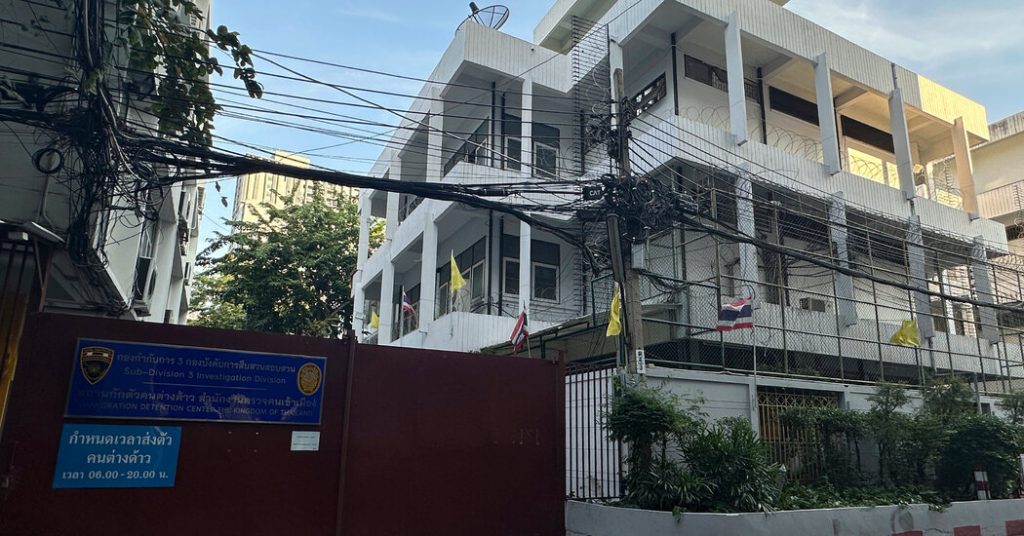Let me tell you a story—a heartbreaking one—about a group of men caught between a rock and a hard place, fighting for their lives while the world watches. These are Uyghur men, an ethnic minority group from China’s Xinjiang region, who have endured persecution for years. They’re Turkic-speaking Muslims, subjected to mass surveillance, internment camps, forced separations from their families, and systemic oppression under China’s drive to stamp out perceived separatism. Many have fled this nightmare, desperate to find refuge in places they thought might give them a new shot at life. But for dozens of them, their journey to freedom has turned into a devastating cycle of detention and fear.
This group of Uyghur men is now in their second week of a hunger strike in Thai detention centers, holding onto their last shred of hope to avoid being deported back to China. The Thai government has suggested no such deportations are in the works, but for these men, words simply aren’t enough. They live with the haunting memory of 2015, when 109 of their fellow Uyghurs were abruptly sent back to China after similar vague reassurances. Many of those detainees vanished thereafter, their fates unknown.
The current hunger strike began on January 10—an act of defiance after the detainees were handed “voluntary return” forms to sign. None of the men agreed to complete the paperwork. But when they were asked to pose for photographs, their fear spiked. It was deja vu, echoing the chilling sequence of events that preceded deportations eight years ago. Since then, the fear of being forcibly returned to a country where they face torture, imprisonment, or worse has consumed them.
According to multiple sources, including secret communications from detainees, the men have consumed only minimal amounts of water since their strike began. Details about the hunger strike were confirmed by activists, relatives, and human rights groups, but Thai immigration officials deny it is taking place. Lt. Gen. Thanit Thaiwacharamas, acting deputy commander of the country’s immigration bureau, dismissed the claims outright, which only deepens the feeling of abandonment the detainees already face.
### A Decade of Limbo
The Uyghurs at the center of this standoff have been stuck in Thai detention centers for over a decade—a miserable limbo with virtually no access to the outside world. Their situation was born out of desperation in 2014, when more than 300 Uyghurs fled their homeland, making perilous journeys through Southeast Asia. They hoped to reach Turkey, a country with a large Uyghur diaspora and a reputation for offering sanctuary to those fleeing persecution. Thailand was supposed to be a brief transit stop. Instead, for some, it became a prison sentence without a release date.
Day-to-day life in detention has taken a heavy toll. The men are malnourished, some struggle with chronic illnesses like heart and lung disease, and medical care is scarce. Over the years, five Uyghur detainees, including two children, have died behind bars in Thailand. Despite these grim realities, the detainees have been denied access to protections they might otherwise be entitled to under international law. Unlike other refugee groups, such as the Rohingya Muslims fleeing Myanmar, the Uyghurs have been blocked from meeting with the U.N.’s refugee agency. Rights activists see this as part of a disturbing pattern of discrimination and neglect.
This blockade leaves the Uyghurs in Thailand trapped. With China cracking down on undocumented Uyghurs in Southeast Asia, their options for escape are non-existent. They’ve appealed to anyone who will listen. One detainee pleaded, “We are desperately seeking help from those living in the free world. You all know what will happen to us if we are sent back to China.” Another lamented that their hunger strike had brought no response from Thai authorities, despite text messages asking for a meeting with the U.N. The silence is deafening.
### Fear Among Exiles
Thailand’s track record of deporting Uyghurs to China gives these men little reason to trust their current captors. Back in 2015, such deportations sparked international outrage. After assurances from Thai leadership that the Uyghurs would be guaranteed safety and “fair justice” in China, the world was confronted with a grim reality: footage aired by Chinese state media showed detainees hooded and boarded onto planes, a chilling display of their helplessness. What became of them after that remains largely unknown. Reports surfaced of a few receiving long prison sentences, but the majority simply disappeared.
Observers fear history could repeat itself, especially as Thailand navigates its delicate geopolitical tightrope with China. Public comments by Thai leaders don’t exactly inspire confidence. Thailand’s defense minister recently mentioned that the issue of the Uyghurs had been discussed in a National Security Council meeting but made little commitment to transparency. Asked if deportations were imminent, he replied vaguely, “I only just heard this from you.”
Further compounding the tension is a recent assassination in Thailand that has rattled exiles and dissidents from authoritarian regimes around the world. Earlier this month, a Cambodian opposition politician was shot in broad daylight in Bangkok. The brazen act has put refugees like the Uyghurs—many of whom already feel hunted by China’s long reach—on even higher alert.
### Rights Activists Sound the Alarm
While Thai officials sidestep questions, human rights organizations and concerned lawmakers have stepped in to amplify the Uyghurs’ plight. On the international stage, U.S. Senator Marco Rubio has voiced grave concerns, calling Thailand’s choices a test of American resolve in standing against China’s abuses of Uyghurs. He urged Thailand not to turn the detainees over, framing it as an opportunity to shine a light on the broader atrocities in Xinjiang.
In Thailand, Senator Angkhana Neelapaijit has taken up the detainees’ cause. A long-time defender of human rights, she’s working with Thai police to secure a meeting with the Uyghurs and plans to raise their situation in Parliament. Reflecting on the events of 2015, Neelapaijit acknowledged the limits of her influence back then when she led the National Human Rights Commission, and she faces uphill battles even now. The previous deportation was called “a flagrant violation of international law” by the U.N., but diplomatic accountability seems to remain elusive.
The detainees’ hunger strike has only deepened concerns among rights activists about their fragile health and psychological despair. It’s clear that time is running out for these men. They’ve been forcibly cut off from the world for years. Now, they’re putting what little energy they have left into a desperate gambit to avoid being swallowed up by a regime they barely escaped once. Their survival hinges, in part, on an international community willing to step in and demand accountability.
### The Silence That Screams
For the Uyghurs waging this life-threatening hunger strike, the stakes couldn’t be higher. Each day they refuse food is another day their bodies weaken, an act of self-sacrifice born out of the certainty that returning to China equals peril. Their demands are simple but enormous: don’t deport us to a place that has made it clear we’re unwelcome and unsafe.
Their hunger strike is not just a plea for survival but also a statement—a reminder of the inhumanity millions of Uyghurs have faced and continue to face under China’s regime. Yet, as their health deteriorates, their desperation stands in sharp contrast with the calculated silence of those who might intervene. Will the world keep its back turned as these men fade away, one by one? Or can their voices break through, rising above the noise of politics and power plays, to finally be heard?
This unfolding tragedy in the heart of Bangkok is a test for us all—to confront injustice, demand accountability, and remember the humanity of those who have been denied it for far too long.









